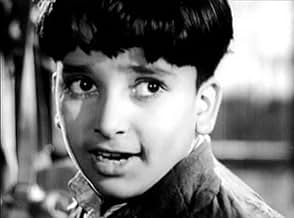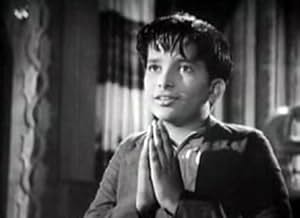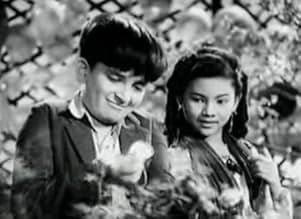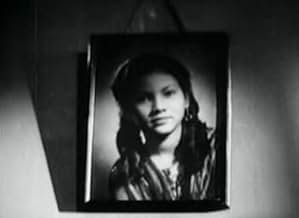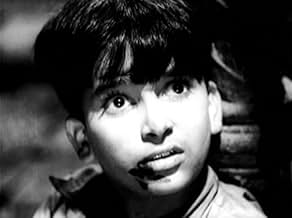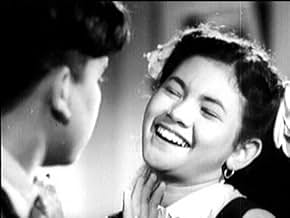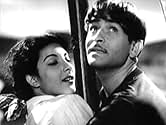CALIFICACIÓN DE IMDb
7.8/10
4.8 k
TU CALIFICACIÓN
Agrega una trama en tu idiomaA poor young man named Raj joins a criminal gang to feed his mother. But when he falls in love with Rita, he decides to reform himself for her.A poor young man named Raj joins a criminal gang to feed his mother. But when he falls in love with Rita, he decides to reform himself for her.A poor young man named Raj joins a criminal gang to feed his mother. But when he falls in love with Rita, he decides to reform himself for her.
- Premios
- 1 nominación en total
Prithviraj Kapoor
- Justice Raghunath
- (as Prithviraj)
Shashi Kapoor
- Young Raj
- (as Shashiraj)
Brij Mohan Vyas
- Dubey (Rita's Father)
- (as B.M. Vyas)
Leela Mishra
- Mr. Raghunath's Sister-In-Law
- (as Leela Misra)
Opiniones destacadas
Musicals in America in their heyday were mostly about the lives of prominent show business personalities or small town middle class Americana, never about the outcast or the urban slum dweller. This is not the case with the films of Indian director, Raj Kapoor, especially in Awaara, a 1951 film and the later Boot Polish. These films call attention to the less fortunate and, in the case of Awaara, the vagabond whose life of crime is the inevitable outcome of growing up in the slums.
In Awaara, Kapoor's real father (Prithviraj Kapoor) plays a heartless judge who accuses his pregnant wife (Leela Chitnis) of infidelity after she was kidnapped by bandits and throws her out of his home (the logic of this eludes me since she was already pregnant when kidnapped). The stern judge staunchly believes that a thief's son will always be a thief and a good man's son will always turn out good. In a series of flashbacks, the film dramatizes the unfortunate consequences of this belief system. Raju, played by the director Raj Kapoor as an adult and by his brother Sashi Kapoor as a child, is born on the streets and grows up in the slums.
Under the guidance of a ruthless bandit named Jagga (K. N. Singh), he turns to stealing to help support his mother. Raj has little to comfort him except for a picture hanging on the bare walls of his house of Rita, his childhood sweetheart played by the stunning Nargis, a real life lover of Kapoor. The romance between Raj and Rita is one of the central motifs of the film and the chemistry between the two is electric. This is especially evident in the boat scene where she performs an exotic dance to the Dum Bhar song, and after she calls him a junglee (savage) and he slaps her in an incident that serves to bring them closer together.
Raju, the tramp, is forced to live on his wits but does so with humor and a Chaplinesque charm. When he finds out the true circumstances of his childhood, however, he sets out to get revenge against his father, the judge, and ends up facing a charge of attempted murder in the judge's own courtroom. Rita, a lawyer herself, defends him as she promised she would years ago. She puts the judge on the witness stand and asks pointed questions about how he condemned his wife and child to a lifetime of poverty. Rita holds him and society responsible for the conditions that led Raju to commit his crime and asks the judge to forgive him and admit that Raju is his son. Raju, in turn, offers an impassioned plea to the court to punish him as a criminal but not to neglect the conditions that gave rise to his life of crime. In the end, a very moving scene of attempted reconciliation between father and son had me wiping away the tears.
Awaara is reminiscent of both 40s film-noir with its dark cobblestone streets and menacing shadows and, in its social conscience, of the great Italian neo-realists like de Sica. But basically, Awaara is still in the Bollywood tradition; that means drama, romance, music, comedy, and action -- all put together in a total package to appeal to a wide audience. With great songs and dances, amazing dream sequences, style and panache, strong drama, and an inspiring message, it is not surprising that Awaara became one of the most popular films in Indian cinematic history. It is one of my favorites as well.
In Awaara, Kapoor's real father (Prithviraj Kapoor) plays a heartless judge who accuses his pregnant wife (Leela Chitnis) of infidelity after she was kidnapped by bandits and throws her out of his home (the logic of this eludes me since she was already pregnant when kidnapped). The stern judge staunchly believes that a thief's son will always be a thief and a good man's son will always turn out good. In a series of flashbacks, the film dramatizes the unfortunate consequences of this belief system. Raju, played by the director Raj Kapoor as an adult and by his brother Sashi Kapoor as a child, is born on the streets and grows up in the slums.
Under the guidance of a ruthless bandit named Jagga (K. N. Singh), he turns to stealing to help support his mother. Raj has little to comfort him except for a picture hanging on the bare walls of his house of Rita, his childhood sweetheart played by the stunning Nargis, a real life lover of Kapoor. The romance between Raj and Rita is one of the central motifs of the film and the chemistry between the two is electric. This is especially evident in the boat scene where she performs an exotic dance to the Dum Bhar song, and after she calls him a junglee (savage) and he slaps her in an incident that serves to bring them closer together.
Raju, the tramp, is forced to live on his wits but does so with humor and a Chaplinesque charm. When he finds out the true circumstances of his childhood, however, he sets out to get revenge against his father, the judge, and ends up facing a charge of attempted murder in the judge's own courtroom. Rita, a lawyer herself, defends him as she promised she would years ago. She puts the judge on the witness stand and asks pointed questions about how he condemned his wife and child to a lifetime of poverty. Rita holds him and society responsible for the conditions that led Raju to commit his crime and asks the judge to forgive him and admit that Raju is his son. Raju, in turn, offers an impassioned plea to the court to punish him as a criminal but not to neglect the conditions that gave rise to his life of crime. In the end, a very moving scene of attempted reconciliation between father and son had me wiping away the tears.
Awaara is reminiscent of both 40s film-noir with its dark cobblestone streets and menacing shadows and, in its social conscience, of the great Italian neo-realists like de Sica. But basically, Awaara is still in the Bollywood tradition; that means drama, romance, music, comedy, and action -- all put together in a total package to appeal to a wide audience. With great songs and dances, amazing dream sequences, style and panache, strong drama, and an inspiring message, it is not surprising that Awaara became one of the most popular films in Indian cinematic history. It is one of my favorites as well.
I have always like watching movies. However, as time went by, I have only known of Hollywood, European, Japanese, and Filipino cinema.
When I learned that Awara is one of Time Magazine's Top 100, I got a copy. The movie called my attention because I haven't seen a Bollywood movie.
I watched Awara, and I was entertained. All the genre you can think of, you'll find it there. Name it: melodrama, action, comedy, romance, music, fantasy. Raj Kapoor craftily weaved them in the almost three hour-long classic.
Behind the melodrama is the social commentary. The conflict between a person versus the orthodox beliefs of the milieu is a recurring theme each of us face in everyday life. Pressures to adhere to the norm led the main character to his plight. Children growing up in squalid areas is an important issue tackled.
The musical sequences showed the movie's multi-faceted nature. It showed references to Chaplin, Rodgers/Hammerstein, and the like. Particularly amazing is the dream sequence in an east meets west setting. Elements of Hindu-Buddhist mythology are mingled with those of ancient Greco-Roman.
The eclectic experience solidified my belief that Bollywood is indeed a pillar of world cinema. I look forward to watching more.
When I learned that Awara is one of Time Magazine's Top 100, I got a copy. The movie called my attention because I haven't seen a Bollywood movie.
I watched Awara, and I was entertained. All the genre you can think of, you'll find it there. Name it: melodrama, action, comedy, romance, music, fantasy. Raj Kapoor craftily weaved them in the almost three hour-long classic.
Behind the melodrama is the social commentary. The conflict between a person versus the orthodox beliefs of the milieu is a recurring theme each of us face in everyday life. Pressures to adhere to the norm led the main character to his plight. Children growing up in squalid areas is an important issue tackled.
The musical sequences showed the movie's multi-faceted nature. It showed references to Chaplin, Rodgers/Hammerstein, and the like. Particularly amazing is the dream sequence in an east meets west setting. Elements of Hindu-Buddhist mythology are mingled with those of ancient Greco-Roman.
The eclectic experience solidified my belief that Bollywood is indeed a pillar of world cinema. I look forward to watching more.
Awaara is an inimitable classic of Indian cinema and, in my opinion, of cinema is general. The film is a commentary on the social and political climate of those years in India, but its relevance remains so palpably strong today it's almost unbelievably how visionary the makers of the films were. Awaara touches upon a host of themes, from gender inequality with references to Indian mythology (Ram's rejection of Sita in the Ramyana), as seen in the story of a woman accused of impurity due to abduction; and the whole age-old debate of nature vs. Nurture, which is a key issue in this film. And the film has a stance on all those matters, which are tackled with honesty and great criticism by the writers. Poverty, a frequent motif in many Kapoor films, is portrayed as the mother of all crimes, and ignorance is the mother of poverty.
But besides being a strong social dramedy with a message, Awaara is just a terrific film - incredible entertainment, a beautiful romantic musical, an affecting human story - the artistic and aesthetic value of which is hard to match or recreate. The camera work is stupendous, the B&W cinematography (Radhu Karmakar) does wonders to the unique narrative, as does the music (Shankar-Jaikeshan). These two ingredients are intertwined in the film's most spectacular and best-photographed part - a lengthy musical dream sequence - the first of its kind in Indian cinema and which captures the protagonist's state through symbolism and introduces both amazingly decorated, lavish sets and phenomenal songs, culminating in the wonderful "Ghar Aaya Mera Pardesi". I can't think of many cinematic moments of such extraordinary artistic and cinematographic merit.
And this is just another part of Awaara. Kapoor's direction is revolutionary in many ways - the ability to create a film which embraces all the possible ingredients of mainstream Hindi cinema and yet imbue it with an atmosphere of authenticity and meaning, much to the point of neo-realism at some points. Indeed, this is characteristic of almost all the films Kapoor made in collaboration with the legendary screenwriter K. A. Abbas - always resulting in a great combination of stylish entertainment and educative value. The dialogue in this film is exactly that, it is alternately realistic, poetic, melodramatic, humorous - and sometimes all at the same time. All of it exists in the film's climax, namely a court sequence where the protagonist sits in the defendant's stand. Ironically, the judge is his own estranged father. It is so often that the film tugs at the heartstrings.
Awaara rests on a truly electrifying chemistry between Raj Kapoor and Nargis. It's not just about the tension and the perceptibly passionate energy, it's about mutual comfort, affection and understanding. One scene between them, when she brands him "savage", is tough viewing but very revealing. This is perhaps Kapoor's best performance as an actor - unquestionably he is at his dashing and stylish best - often typically humorous and flamboyant, embraces the Chaplinesque tramp persona - but his inner turmoil, anger and rage are so tangibly powerful. As played by Nargis, one of the most luminous actresses I can imagine, Rita sees all of it - it's in her eyes and every gesture. Nargis shines in this performance, capturing every bit of her character's perceptive and compassionate nature and looking madly in love throughout (maybe she really was).
Kapoor's character actors are brilliant. Prithviraj Kapoor is excellent as the prejudiced father and judge Raghunath. He may be impressive in his stylish demeanor but his pathetic weakness more than helps create one of the uniquely flawed and grayish film characters of the time. Less complex obviously but still fantastic is K. N. Singh as Jagga, a vengeful criminal who is pretty much an archetypal villain but also the one some viewers might find more sympathy for compared to Raghunath. Leela Chitnis is brilliant in a heartbreaking performance as Raj's suffering and kind mother. It is her character I felt most for, and her story is the one I thought could have been even better explored. Awaara is a gem of Indian cinema, a film that is always a pleasure to watch and which Raj Kapoor will certainly be remembered for.
But besides being a strong social dramedy with a message, Awaara is just a terrific film - incredible entertainment, a beautiful romantic musical, an affecting human story - the artistic and aesthetic value of which is hard to match or recreate. The camera work is stupendous, the B&W cinematography (Radhu Karmakar) does wonders to the unique narrative, as does the music (Shankar-Jaikeshan). These two ingredients are intertwined in the film's most spectacular and best-photographed part - a lengthy musical dream sequence - the first of its kind in Indian cinema and which captures the protagonist's state through symbolism and introduces both amazingly decorated, lavish sets and phenomenal songs, culminating in the wonderful "Ghar Aaya Mera Pardesi". I can't think of many cinematic moments of such extraordinary artistic and cinematographic merit.
And this is just another part of Awaara. Kapoor's direction is revolutionary in many ways - the ability to create a film which embraces all the possible ingredients of mainstream Hindi cinema and yet imbue it with an atmosphere of authenticity and meaning, much to the point of neo-realism at some points. Indeed, this is characteristic of almost all the films Kapoor made in collaboration with the legendary screenwriter K. A. Abbas - always resulting in a great combination of stylish entertainment and educative value. The dialogue in this film is exactly that, it is alternately realistic, poetic, melodramatic, humorous - and sometimes all at the same time. All of it exists in the film's climax, namely a court sequence where the protagonist sits in the defendant's stand. Ironically, the judge is his own estranged father. It is so often that the film tugs at the heartstrings.
Awaara rests on a truly electrifying chemistry between Raj Kapoor and Nargis. It's not just about the tension and the perceptibly passionate energy, it's about mutual comfort, affection and understanding. One scene between them, when she brands him "savage", is tough viewing but very revealing. This is perhaps Kapoor's best performance as an actor - unquestionably he is at his dashing and stylish best - often typically humorous and flamboyant, embraces the Chaplinesque tramp persona - but his inner turmoil, anger and rage are so tangibly powerful. As played by Nargis, one of the most luminous actresses I can imagine, Rita sees all of it - it's in her eyes and every gesture. Nargis shines in this performance, capturing every bit of her character's perceptive and compassionate nature and looking madly in love throughout (maybe she really was).
Kapoor's character actors are brilliant. Prithviraj Kapoor is excellent as the prejudiced father and judge Raghunath. He may be impressive in his stylish demeanor but his pathetic weakness more than helps create one of the uniquely flawed and grayish film characters of the time. Less complex obviously but still fantastic is K. N. Singh as Jagga, a vengeful criminal who is pretty much an archetypal villain but also the one some viewers might find more sympathy for compared to Raghunath. Leela Chitnis is brilliant in a heartbreaking performance as Raj's suffering and kind mother. It is her character I felt most for, and her story is the one I thought could have been even better explored. Awaara is a gem of Indian cinema, a film that is always a pleasure to watch and which Raj Kapoor will certainly be remembered for.
This is a classic Bollywood movie and seminal Raj Kapoor - Nargis vehicle, forcing home to the audience all manner of stereotypes, prejudices and assumptions before systematically dismantling them all with a sledgehammer. It was another of RK's successful and respectful attempts at mass entertainment mixed with mass education, generations later it's all so obvious that unfortunately we can lose sight of how much good it did at the time and just how well-intentioned it was.
I was watching the colourful Suraj a while ago and was reminded of old black and white Awara which I hadn't seen in decades – it's another take on once a bandit's son always a bandit's son; or, Blood vs Destiny. Delinquent wastrel and felon Raj is the kicked about son of a strict old-fashioned judge (played by Prithviraj) which neither of them realise, he and childhood friend Nargis who is now the judge's ward fall in love and, well, it spirals out of control for everyone. Is it Nature or is it Nurture that has made him a proud tramp? Some lovely noirish photography and atmospheric flashback scenes complement a melodramatic storyline, and there's even time for an admirable dream/nightmare sequence. It's a marvellous, if very contrived film with plenty of ideas, some tremendous images and great music by Shankar - Jaikishan as it is but as usual for me whenever the incomparable Lata sings it's turned into something even more special. Favourite bits: Nargis never looked lovelier or more iconic throughout but Aa Jao Tadapte Hain Arman with RK stroking her hair takes top prize; the literally dreamy and fascinating Tere Bina Aag Yeh Chandni; and RK does his anthem Awara Hoon too. According to Lata it took a whole night to record the music for the dream sequence.
So many sincere films made over the last 50 years have no morality, at the most charitable most don't even know the meaning of the word; so what's so bad about a film having too much? Nothing wrong at all with Good beating Evil! Imho, even though poverty still breeds crime while Our Betters still deny it, Raj Kapoor's finest film.
I was watching the colourful Suraj a while ago and was reminded of old black and white Awara which I hadn't seen in decades – it's another take on once a bandit's son always a bandit's son; or, Blood vs Destiny. Delinquent wastrel and felon Raj is the kicked about son of a strict old-fashioned judge (played by Prithviraj) which neither of them realise, he and childhood friend Nargis who is now the judge's ward fall in love and, well, it spirals out of control for everyone. Is it Nature or is it Nurture that has made him a proud tramp? Some lovely noirish photography and atmospheric flashback scenes complement a melodramatic storyline, and there's even time for an admirable dream/nightmare sequence. It's a marvellous, if very contrived film with plenty of ideas, some tremendous images and great music by Shankar - Jaikishan as it is but as usual for me whenever the incomparable Lata sings it's turned into something even more special. Favourite bits: Nargis never looked lovelier or more iconic throughout but Aa Jao Tadapte Hain Arman with RK stroking her hair takes top prize; the literally dreamy and fascinating Tere Bina Aag Yeh Chandni; and RK does his anthem Awara Hoon too. According to Lata it took a whole night to record the music for the dream sequence.
So many sincere films made over the last 50 years have no morality, at the most charitable most don't even know the meaning of the word; so what's so bad about a film having too much? Nothing wrong at all with Good beating Evil! Imho, even though poverty still breeds crime while Our Betters still deny it, Raj Kapoor's finest film.
Awaara is a stunning example of full tilt filmmaking. Featuring superb (and appropriate) musical interludes by the Shankar-Jaikashan team, this film effortlessly blends a wide range of influences: noir, gothic horror, neo-realism, and the surrealism of Jean Cocteau all come into play. Raj Kapoor and Nargis are one of the finest screen couples of all time, equaling if not topping Jean-Louis Barrault and Arletty in Children of Paradise, another possible cinematic influence on Kapoor, who also directed. This is an exciting, moving, and unforgettable film.
¿Sabías que…?
- TriviaIn Awaara, there are three genaration of the Kapoor family in the film. There is Deewan Kapoor in the film, who was the grandfather of Raj Kapoor (father of pritviraj ) who plays the role of judge, who comes in the beggining of the film and in the end, then Raj Kapoor's father, Pritviraaj and also his young brother, Shashi Kapoor (junior raj kapoor ) were also in this film. As a filmaker this was Raj Kapoor, his third film. This film got very famous in Russia. In a outdoor scene of Raj with Nargis, in the background, the music of the song ' na mangu sona chandi' could be heard there, 20 years later this tune was used in a song of. Bobby.
- ConexionesFeatured in Century of Cinema: And the Show Goes On: Indian Chapter (1996)
- Bandas sonorasAwara Hoon
Sung by Mukesh
Music composed by Shankarsingh Raghuwanshi and Jaikishan Dayabhai Panchal (as Shankar-Jaikishan)
Lyrics by Shailendra
Selecciones populares
Inicia sesión para calificar y agrega a la lista de videos para obtener recomendaciones personalizadas
- How long is Awaara?Con tecnología de Alexa
Detalles
- Tiempo de ejecución3 horas 13 minutos
- Color
- Relación de aspecto
- 1.37 : 1
Contribuir a esta página
Sugiere una edición o agrega el contenido que falta

Principales brechas de datos
What is the Spanish language plot outline for El vagabundo (1951)?
Responda

